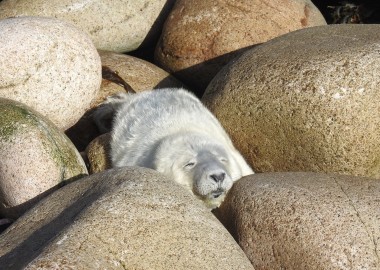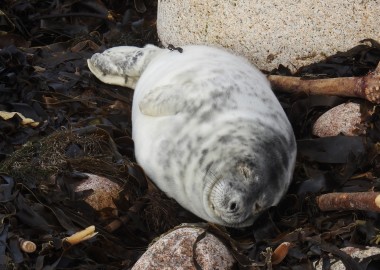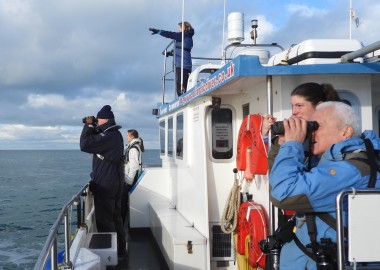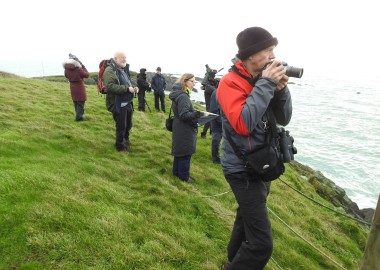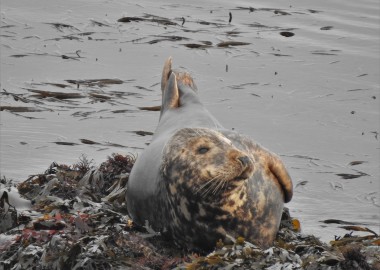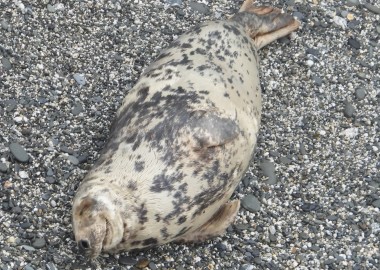Green and blue recovery
It has been a tough year for everyone, but at CSGRT, we are ending 2020 on a high, with something wonderful to celebrate!
Excitingly, we have been awarded our biggest grant ever by the Green Recovery Challenge Fund to:
- Help people have amazing seal experiences without impact
- Create ‘Watching Seals Well’ resources (website, signs, leaflets)
- Learn about human interaction with seals by collecting critical research evidence
- Tell seal stories to motivate us all to ‘Give Seals Space’ and be ‘Seal Friendly’
- Develop the next generation of marine conservation leaders
- Create opportunities for #SealSmiles to improve fitness, mental health and wellbeing
Grey seals, our heritage
Few day old white coated seal pup on the boulder beach where it was born (left) A well earned rest for Willow the moulted, month old seal pup as she explores her new world (right)
The UK is home to 34% of the world’s grey seals (yet there are still more red squirrels here than grey seals!) Grey seals have been in Cornwall since Mesolithic times. Today a wide variety of cumulative human impacts put this globally rare, heritage species at risk.
Our research shows that seals in Cornwall already experience chronic levels of disturbance. Yet this is the one issue we can all do something about EASILY! We just need to ‘GIVE SEALS SPACE’.
Sharing how to ‘Watch Seals Well’
CSGRT’s ‘People Protecting Precious Places’ project is all about communicating this message – how to watch seals well to get the best out of your seal watching experience.
CSGRT volunteers survey all year round from land and sea
We hope to share messages, leaflets and signage across our region and nationally in partnership with the Seal Alliance.
Community based volunteer network
We aim to work with community-based stakeholders to ensure our seals thrive. Our amazing network of 350+ volunteers give up their time all year round to routinely survey wild seals from our beautiful coastline.
This gets volunteers out and about, active and nature provides the therapy to enhance everyone’s mental wellbeing.
CSGRT research gives seals a voice by telling their stories: Connecting our terrestrial lives to theirs in the sea.
We did 3794 surveys in 2019, rewarding us with 120,000 photos and 8722 identifications of seals right around the southwest. Each seal keeps its unique fur pattern for life…know the pattern, know the seal.
Telling individual seal life histories and movements helps connect people to our marine world, as seals leave the sea to haul onto land to rest, digest, socialise and pup.
We can tell their stories to provide an early warning system of the invisible shifts happening beyond our terrestrial world. These happen in Cornwall first in the UK. Seal stories inspire us all to change our behaviour at home – for example not putting bleach down the toilet that ends up in the sea with our seals.
Developing the next generation of marine conservation leaders
This Green Recovery Challenge Fund grant will help CSGRT to retain and create jobs for next generation of marine conservation leaders. We aim to provide career opportunities for younger people to experience and develop new skills.
All our marine rangers have quarterly 360-degree personal reviews and work through our Seal Environment And Leadership (SEAL) Programme standards from Foundation to Intermediate and Advanced level.
Providing evidence and information to national agencies and seal groups across the UK
Seals of all ages benefit from our evidence based marine conservation work with government agencies, NGOs and passionate local marine groups. Juvenile male called ‘Osprey’ (left) and adult female ‘Carousel’ who we have identified from 2001 to 2020 (right).
CSGRT work with statutory agencies such as the Environment Agency, Natural England and DEFRA (The Seal Network UK) to provide evidence on key issues affecting seals with a solutions focused approach. This is shared with partner seal groups around the UK.
For Sue Sayer, Director and Founder of Cornwall Seal Group Research Trust, this is “an organisational changing grant to transform peoples’ relationship with seals and help us all to share our seas successfully, so marine life can thrive. This is our best chance to protect seals by raising awareness about ways to enjoy our coastline AND help seals. We are hugely grateful to the Green Recovery Challenge Fund from the Heritage Fund UK for making this happen and are delighted to shade the Green Recovery Fund ‘blue’, showing that it is inclusive of our critical marine environment. This is a fantastic validation of a massive team effort, achieved by a wonderful, awe inspiring and huge volunteer network over 20 years.”
Click here to hear Sue’s interview about the grant on BBC Radio Cornwall:
Environment Minister, Rebecca Pow, said: “These projects will drive forward work across England to restore and transform our landscapes, boost nature and create green jobs, and will be a vital part of helping us to build back greener from coronavirus. I look forward to working with environmental organisations as these projects help address the twin challenges of biodiversity loss and climate change, while creating and retaining jobs as part of the green recovery.”
Ros Kerslake, Chief Executive, National Lottery Heritage Fund, said: “Supporting our natural environment is one of the most valuable things we can do right now. All these projects are of huge benefit to our beautiful countryside and wildlife, but will also support jobs, health and wellbeing, which are vitally important as we begin to emerge from the coronavirus crisis.”
Huge thanks to everyone – our collaborative achievements have led our charity to this success!
Massive thanks to the Green Recovery Challenge Fund, Defra and the National Lottery Heritage Fund. You have made our year!
#GreenRecoveryChallengeFund #TogetherForOurPlanet @DefraGovUK @HeritageFundUK @Defra @EnvironmentAgency @NaturalEngland

